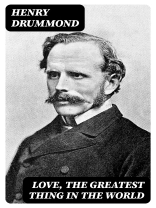In ‘Love, the Greatest Thing In the World, ‘ Henry Drummond explores the profound essence of love as the highest virtue, emphasizing its transformative power in human relationships and society at large. Written in a lyrical, yet didactic style, Drummond intertwines anecdotes, biblical references, and philosophical reflections to illustrate love’s role as a unifying force. Situated in the 19th-century revivalist movement, the work emerges as a response to the growing industrialization and materialism of the era, seeking to rekindle spiritual depth and interpersonal connection through the lens of divine love. Henry Drummond (1851-1897), a Scottish preacher, biologist, and writer, was deeply influenced by the Ethical Movement and the Social Gospel, which sought to address societal issues through moral reform and spiritual awakening. His extensive work as a revivalist and his interest in science reflect his belief in harmonizing faith with rational thought. These experiences culminated in this seminal work, wherein he articulates a comprehensive vision of love that challenges the prevailing sentiments of his time. This book serves not only as a theological treatise but also as a powerful manifesto for those seeking to understand the dynamics of love and its central role in human existence. Drummond’s eloquent prose and heartfelt declarations make it a timeless read, offering invaluable insights for anyone interested in the complexities of love, morality, and the human spirit.
关于作者
Henry Drummond (1851–1897) was a renowned Scottish evangelist, biologist, and writer, who garnered acclaim for his work in the intersections of science and religion. His influence reached a global audience through his timeless treatise ‘Love, the Greatest Thing in the World, ‘ an exposition of 1 Corinthians 13, which remains a beloved text on the nature and supremacy of love. Drummond’s literary style was marked by a blend of intellectual rigor with a heartfelt evangelical appeal, making his writings accessible to both the scholarly and the layman. As a lecturer in natural science, Drummond’s endeavour to reconcile evolutionary theory with Christian theology was evident in his other noted works such as ‘Natural Law in the Spiritual World’ and ‘The Ascent of Man.’ His scholarly contributions offer a window into the Victorian era’s pursuit of understanding faith through the lens of emerging scientific knowledge. Drummond’s eloquence and deep humanity in discussing spiritual matters have left an indelible mark on Christian literature, ensuring his continued reverence in theological studies. His works, often characterized by their practical application of Christian principles, reflect his personal conviction that love was the utmost virtue — a belief that still resonates with readers around the world.












